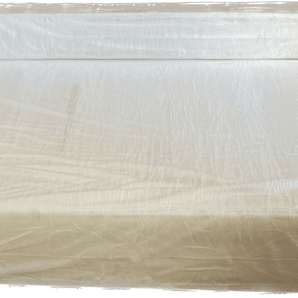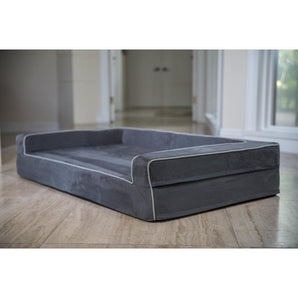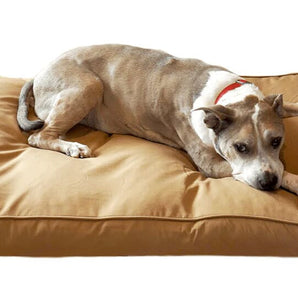Sneezing in dogs isn't much different from sneezing in humans; it's a natural response to irritations in the dog's nasal passages. Dogs, like us, sneeze to expel irritants and clear their nasal pathways.
The reasons for these irritations can vary widely. The anatomy of a dog’s nasal passage makes it a prime spot for dust, pollen, and other particles to settle, leading to frequent sneezing. But, sneezing can also be a communication tool among dogs or a reaction to excitement during playtime.
So how do you know why your dog is sneezing and if it's cause for concern?
Here are eight of the most common reasons for dog sneezing:
-
Allergies
-
Irritants and Foreign Objects in the Environment
-
Respiratory Infections and Illnesses
-
Nasal Mites and Other Parasitic Infections
-
Dental Issues and Oral Health Problems
-
Excitement or Playfulness
-
Environmental Factors such as Dust or Pollen
-
Reverse Sneezing
Why Do Dogs Sneeze?
Dogs sneeze for a variety of reasons, ranging from simple triggers to more complex health issues. Just like in humans, sneezing is a natural reflex that helps dogs clear their nasal passages of irritants like dust, pollen, or even pepper.
1. Allergies

Just like with humans, allergies are a frequent cause of dog sneezes. Dogs can be allergic to a wide range of substances, from common household dust to more specific allergens like pollen, molds, or even certain ingredients in their food.
Symptoms of food allergies and allergic reactions in dogs can vary but often include sneezing, itching, watery eyes, and even skin irritation. Managing these allergies usually involves identifying the allergen and reducing exposure, which might mean more regular cleaning of your home, using a washable dog bed that can be cleaned frequently, or discussing dietary changes with your vet.
2. Irritants and Foreign Objects in the Environment
Apart from seasonal allergies, simple irritants in your dog’s immediate environment can be enough to trigger a sneezing fit. Smoke, perfumes, cleaning agents, and even small particles like bits of toys or food can get caught in nasal passages. Regular cleaning and maintaining a clutter-free space can help minimize these risks.
Pay particular attention to the areas where your dog spends most of their time, such as their sleeping and eating spots. Using non-toxic cleaning products can reduce the likelihood of irritant exposure. Additionally, regularly inspecting and cleaning your dog's toys can prevent small pieces from breaking off and becoming nasal irritants. Creating a clean and safe environment for your dog not only reduces sneezing episodes but also promotes overall health.
3. Respiratory Infections and Illnesses
Just like humans, dogs can catch colds or suffer from more serious respiratory infections that cause sneezing. These infections could be bacterial, viral, or even fungal. Common signs that your dog might be suffering from a nasal infection include persistent sneezing, coughing, runny nose, or lethargy. Regular veterinary check-ups can help you detect and treat nasal infections and fungal infections quickly and avoid more serious complications.
4. Nasal Mites and Other Parasitic Infections in Your Dog's Nose
Although less common, nasal mites are a parasitic cause of sneezing in dogs. These tiny creatures live and breed in the nasal passages and sinuses, causing significant discomfort. Symptoms typically include frequent sneezing, nasal discharge, and sneezing blood. Treatment usually involves antiparasitic medications prescribed by a vet. Keeping your pet’s bedding clean and ensuring they have a healthy living environment can help prevent nasal mites.
5. Dental Issues and Oral Health Problems
Surprisingly, dental issues can also lead to sneezing in dogs. Problems like tooth abscesses or gum disease can cause infection that spreads to the nasal passages. This is particularly true for issues affecting the upper canine teeth. Regular dental check-ups, proper oral hygiene, and chew toys that help clean teeth can reduce the risk of such problems.
In addition to routine dental care, it’s important to look for signs of dental issues, such as bad breath, difficulty eating, pawing at the mouth, or excessive drooling. If you notice any of these symptoms, a visit to the vet may be needed. Early intervention can prevent the spread of infection and alleviate discomfort for your dog.
6. Excitement or Playfulness Induced Sneezing

Have you ever noticed your dog sneezing a lot during a particularly exciting play session? This is known as "play sneezing" and is generally a normal behavior indicating your dog is having a good time. It’s believed to be a sign of non-aggression and can be a communication tool to show other dogs (and you) that their intentions are playful.
7. Environmental Factors such as Dust or Pollen
Environmental factors like dust, pollen, and mold are common allergens that can cause sneezing. Seasonal changes can often bring about increased exposure to these allergens. To help minimize your dog’s exposure to environmental allergens, consider using an air purifier in your home and regularly washing your dog's bedding.
During high pollen seasons, try to keep windows closed and limit your dog’s outdoor activities when pollen counts are at their peak. Regular grooming and bathing can also help remove allergens from your dog’s coat, reducing the risk of sneezing and discomfort.
8. Reverse Sneezing Episodes in Dogs
Unlike regular sneezing, where air is forcefully expelled from the nose, reverse sneezing involves rapid inhalation through the nose, often producing a snorting or honking sound. This can occur suddenly and may last for several seconds to a minute. It happens when the soft palate and throat become irritated, causing a spasm that results in the characteristic noise.
While it can be unsettling to see your dog in the midst of a reverse sneezing episode, it’s typically not painful or dangerous. However, if you notice these episodes are frequent or accompanied by other symptoms such as nasal discharge, coughing, or difficulty breathing, it may be a sign of something more serious.
When to Seek Veterinary Care

Sneezing in dogs can sometimes just be a quirky part of their day-to-day activities, but it can also be a signal of underlying health issues that require professional attention. That's why it's important to know when a dog sneeze is just a sneeze and when it might be something more serious needing veterinary care.
Take note of how often your dog sneezes and the context in which it happens. Is it after playing in the yard, during a cleaning session, or seemingly out of nowhere? This can help you identify potential triggers for why your dog is sneezing, such as allergies or playfulness.
Also, watch for additional signs that are not typical of normal sneezing, such as nasal discharge, blood, or if your dog seems to be in distress while sneezing. These symptoms can suggest more severe conditions like infections, nasal blockages, or nasal tumors.
If your dog's sneezing becomes frequent, severe, or is accompanied by other signs such as trouble breathing, be sure to call your veterinarian immediately.
These symptoms could indicate a number of health issues—from dental problems to respiratory infections or foreign bodies lodged in your dog's nose. Remember, treating health issues early can prevent more severe complications and ensure your dog’s long-term health and comfort.
Maintain an open line of communication with your vet and make sure your dog has a clean and comfortable living environment in order to keep your four-legged friend healthy. Dog sneezing may be a small sign, but it can tell a big story about your pup's health.
How to Address the Underlying Causes of Your Dog's Sneezing

While occasional sneezing is mostly harmless, if your pup is experiencing excessive sneezing or showing other symptoms of allergies, it's worth taking a look at your dog's home environment to pinpoint underlying causes.
Adjusting Your Home Environment
Simple adjustments in your home can make a big difference. If you suspect allergens like dust or pollen are the culprits, consider increasing the frequency of cleaning, using air purifiers, or even adjusting your HVAC system with better filters.
For dogs prone to allergies, maintaining a clean space is key. This includes their sleeping area. Using a hypoallergenic dog bed can provide a safe, allergen-free resting space for your pup. These beds are designed not only for comfort but also to minimize exposure to irritants that could trigger sneezing.
Ongoing Monitoring and Care
Continue to monitor your dog’s health after implementing changes. If sneezing decreases, you’ll know the adjustments are working. If the situation doesn’t improve or excessive sneezing worsens, you may need to call your veterinarian for further investigation or a different treatment approach. Keeping your dog comfortable and healthy is an ongoing process, and staying attentive to their needs will help you ensure they live a happy and sneeze-free life.
Remember, while occasional sneezing is normal, frequent or uncontrollable sneezing deserves attention. When in doubt, always consult with your veterinarian.





